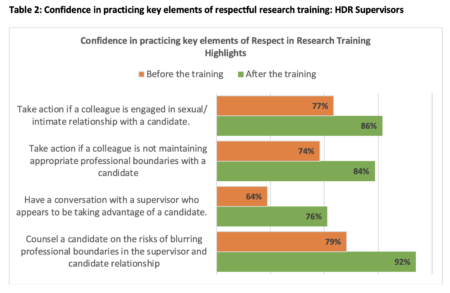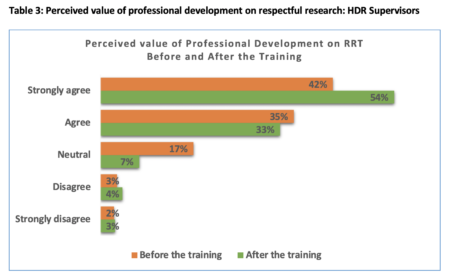Authors:
Associate Professor Robyn Barnacle, Academic Lead, research training and supervisor development, School of Graduate Research, RMIT University.
Professor Denise Cuthbert, Associate Deputy Vice-Chancellor Research Training and Development, School of Graduate Research, RMIT University.
Dr Leul Tadesse Sidelil, Research Fellow, School of Graduate Research, RMIT University.
Introduction
This article tells the story of how RMIT has utilised the ACGRs Respectful Research Training resource. RMIT adopted the resource following its launch in 2018 and have adapted the materials to create our own bespoke program to drive culture change towards respect in graduate research. The program targets sexual assault and harassment (SASH) prevention and promotes a safe and respectful training environment. It is enterprise-wide in scope and, to our knowledge, we are the first Australian university to fully implement the program at scale.
The ACGR initiative
The ACGRs Respectful Research Training initiative aims at promoting respect in PhD and Master by Research degree programs and is a key outcome of the landmark summit of Australian graduate research education leaders in 2018. The summit was a response to the Australian Human Rights Commission (AHRC), (2017) study highlighting the exposure of postgraduate students to various forms of gendered and coercive conduct, such as SASH, by academic staff.
The ACGR resource, for use by member universities, was funded via subscriptions and comprises:
(1) Six high-quality videos dramatizing realistic scenarios in research training highlighting challenges in maintaining professional boundaries for PhD and Master by Research degree candidates and their supervisors, and;
(2) An instructional manual to support the professional development of all graduate research stakeholders.

Image 1: Video still: Candidate, Colleague or Cleaner (ACGR)

Image 2: Video still: Gifts for the supervisor (ACGR)
How did RMIT adapt the learning materials?
At RMIT we incorporated the ACGR learning resource into a bespoke program in two versions, one for HDR candidates and one for HDR supervisors. A customised self-directed e-module (40 minutes) and seminar (2 hours) were created for each cohort. The e-module aims to develop broad, foundational knowledge, which is further enhanced and deepened by the cross-disciplinary collegiate seminar.
Consistent with the respect rubric, the content addresses wide-ranging disrespectful conduct and workplace harm, focusing on the three key risk factors identified in the ACGR resource:
- the inherent power imbalance within the supervisor(s)–candidate relationship
- the ambiguity that arises when boundaries are not clearly defined, and
- the hybrid identities of research candidates who are both students and researchers in training, often functioning like colleagues.
Incorporating the ACGR resource into a complete learning program requires additional content and learning design to scaffold the key content and ensure institutional relevance. At RMIT, we tailored our program to ensure relevance to the institutional context and breadth of learning. This includes incorporating:
- Broad explanatory and conceptual information, for example, concerning differential power and professional boundaries.
- Relevant policy, such as staff student relationships, appropriate conduct, conflict of interest, and the responsibilities of all parties
- Information about services that are available for support, such as where to go for help, advice or to make a report or disclosure
- Where to find further professional development opportunities.
Implementation
Our Program was endorsed by the senior executive, including the then Vice-Chancellor (VC), who supported mandating this training for all supervisors. It was also adopted as an action item of the VC’s Advisory Committee, established in response to Change the Course. This strong executive support enabled additional resourcing and allowed the program to be framed as part of the university’s broader response to Change the Course and leverage off the range of existing campaigns under the banner of Respect.
A two-staged implementation process was adopted, beginning with HDR supervisors followed by HDR candidates once the first phase reached saturation. To date, the first phase of the rollout is complete, with all existing supervisors having completed the program: around 1400 academics. The candidate facing program has completed user testing and is now a requirement for all candidates commencing from 2023. See table 1.

Table 1. RMIT University Respectful Research Training program overview
Impact
Promotion and longevity of the program is aided substantially by its integration with supervisor registration and candidate enrolment requirements. An additional three key factors are also notable:
- Cross-institutional buy in and support;
- Executive endorsement, and;
- Alignment with existing institutional initiatives, such as Now. Always and Athena SWAN commitments.
We have two evaluation mechanisms to assess impact: post-seminar supervisor evaluations and a comprehensive participant evaluation. Results are promising but it is too soon to know whether the cultural changes sought will be fully realised in in terms of measurable impacts and outcomes.
1. Post-seminar supervisor evaluation
Completed by 250 participants to date, results suggest high levels of satisfaction with the program, scoring a mean response of 4.5 out of 5.
2. Comprehensive participant evaluation
This comprises a base-line survey of supervisors designed to elicit pre-and post-training levels of understanding and confidence in using key concepts and select interviews. Survey results are promising, showing improvement across every item tested: enhanced knowledge and understanding of key concepts, confidence in putting into practice learnings from the program and positivity regarding the professional development value of the training.
The standout area of improvement is the high proportion of participants who report being confident and very confident about practising key elements of respectful research training – see table 2.
Table 2: Confidence in practicing key elements of respectful research training: HDR Supervisors

As Table 3 illustrates, the survey results also show uplift in perception of the value of such training.
Table 3: Perceived value of professional development on respectful research: HDR Supervisors

Overall, the improvements observed suggest that the program is supporting RMIT’s effort to foster a safe and respectful environment for research training and prevent issues such as sexual assault and harassment.
Conclusion
Our view is that, on balance, respect-based programs have potential to achieve key aims, such as awareness raising and increasing the confidence of participants to deal with critical situations. This assessment comes with important caveats. The inherent limitations of these approaches need to be recognised; namely, that by masking the gendered basis of power in higher education, this approach does little to address the underlying causes of gender-based violence. For those delivering programs, it is also necessary to anticipate in advance the need for mitigation strategies in both program design and delivery. We discuss these in more detail, as well as the broader theoretical and practical merits and drawbacks of the program, here: Barnacle et al., 2022.
References
Australian Council of Graduate Research (ACGR). (2021). Key Initiatives: Respectful Research Training. https://www.acgr.edu.au/key-initiatives/respectful-research-training/
Australian Human Rights Commission (AHRC). (2017). Change the Course: Report on the Sexual Assault and Sexual Harassment at Australian Universities. https://humanrights.gov.au/sites/default/files/document/publication/AHRC_2017_ChangeTheCourse_UniversityReport.pdf
Barnacle, R., Cuthbert, D., Hall, A., & Sidelil, L. T. (2022). Respect@Uni: A feminist insider perspective on respect-based culture change in higher education. Critical Studies in Education, 1-19. https://doi.org/10.1080/17508487.2022.2143837

Leave a comment